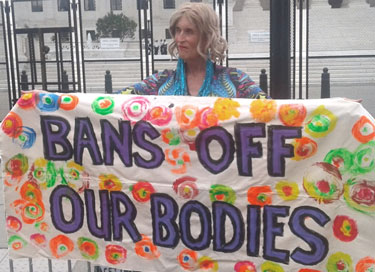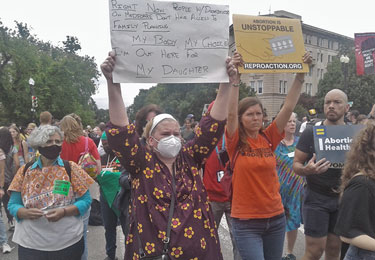Public health advocates, leaders and organizations were swift to condemn the June 24 Supreme Court decision to overturn Roe v. Wade, reproaching justices for putting politics over public health and warning of the serious health harms to come.
Written by Justice Samuel Alito, the decision in Dobbs v. Jackson Women’s Health Organization is “an error of science, a lapse in values and a misguided punch to a nation still reeling over a pandemic,” said APHA Executive Director Georges Benjamin, MD, in a statement. “It is the greatest setback for reproductive rights in more than a generation and among the worst decisions in Supreme Court history.”
The decision will have “real and immediate consequences,” said President Joe Biden during midday remarks, warning that maternal mortality in America will climb. He pledged to protect access to contraception, abortion medication and the ability of women to travel for abortion care.
“Today the Supreme Court expressly took away a constitutional right for the American people. They didn’t limit it, they simply took it away,” Biden said. “With Roe gone, let's be very clear: The health and life of women in this nation are now at risk."
The court decision will have wide ramifications, affecting everything from domestic violence to cancer treatment, health advocates warned. Read a sampling of the reactions:
APHA Executive Director Georges Benjamin, MD
“The Supreme Court decision sets the nation back decades and demands action by all of us to protect reproductive freedom for all. A public health strategy to achieve health in all policies, economic equality, social justice and human rights should protect and advance access to abortions and reproductive justice.”
Clare Coleman, president and CEO of the National Family Planning and Reproductive Health Association
“Today’s ruling completely disregards the devastating impact banning abortion will have on the ability of millions of people, particularly women, to participate fully in society. The court has created a nightmarish reality where people will be forced to remain pregnant against their will, and the impact will be disproportionately felt by Black, Indigenous and other people of color; LGBTQ people; people with disabilities; those with no or low incomes; and young people.”
Jocelyn Frye, president, National Partnership for Women and Families 
“Today's reversal is the latest installment of a coordinated, nationwide campaign to roll back the civil rights and human rights that generations of activists gave their blood, tears and sacrifice to win. The overturning of Roe imperils the right to privacy, which also protects access to birth control and the ability of all Americans to marry the person they truly love. At the same time, many of the same states enacting extreme abortion bans across our country continue to simultaneously enact laws that make it harder for people to exercise their fundamental right to vote.”
Joni Madison, interim president, Human Rights Campaign
When the Supreme Court is willing to throw 50 years of precedent out the window, it proves that we are at an exceedingly dangerous, unprecedented moment...It shows that all of our rights are on the line right now, as state lawmakers will be further emboldened to test the limits of our hard-won civil rights. Women are under attack, LGBTQ+ people are under attack, BIPOC people are under attack, and we are justifiably outraged. We cannot relent — we must fight back.”
Moira Szilagyi, MD, PhD, FAAP, president, American Academy of Pediatrics
“Today’s ruling means that in many places in the United States, this evidence-based care will be difficult or impossible to access, threatening the health and safety of our patients and jeopardizing the patient-physician relationship. This decision carries grave consequences for our adolescent patients, who already face many more barriers than adults in accessing comprehensive reproductive health care services and abortion care.”
American Cancer Society
“As some states signal a determination to define personhood at fertilization, we are concerned about potential threats to a pregnant woman’s ability to receive rapid cancer treatment. Every patient should be able to increase their likelihood to survive cancer by having the option to start cancer therapy immediately, regardless of pregnancy status.”
Esta Soler, president and founder, Futures Without Violence
“Today’s U.S. Supreme Court ruling in Dobbs v. Jackson Women’s Health Organization will cause real harm to those who are seeking an abortion who are denied access to this basic health care, with people who have experienced rape, incest and domestic violence sure to suffer greatly. By giving state lawmakers license to deny pregnant people the health care they need, the Court has denied millions the ability to decide when it is safe and when they feel ready to have a child, putting many women, trans people and children in harm’s way.”
Rep. Lucille Roybal-Allard, D-Calif.
“There was a time before Roe when women sought out clandestine clinics with unlicensed providers to end an unwanted pregnancy, often resulting in serious complications or death. The decision that the Supreme Court advanced today not only infringes on a women’s right to choose but has also created a public health crisis for millions of women across our nation.”
Ryan Mire, MD, FACP, president, American College of Physicians
“With the final decision from the Supreme Court, access has already disappeared in the states with automatic bans on abortion, and it is likely to encourage other states to pass similarly restrictive policies. The decision is particularly concerning because it has the potential to be applied much more broadly than just to abortion services. Although the majority opinion states that the decision applies only to abortion, ACP is concerned that by eroding the constitutional right to privacy, the decision has the potential to restrict the ability of patients to access contraception or fertility treatments in some states, or to threaten other constitutional privacy protections.”
Kristin Rowe-Finkbeiner, executive director and CEO of MomsRising
“To call this ruling deeply harmful and utterly wrong is a gross understatement. Without question, low-income women, women of color, young and immigrant women, rural women, people with disabilities and those who are LGBTQ will suffer the most because of this ruling. It will have devastating health and economic consequences and return us to the days when pregnant people suffer and die without the health care they need.”
Nancy Northup, president and CEO of the Center for Reproductive Rights
“While public support for access to abortion is at an all-time high, the court has hit a new low by taking away — for the first time ever — a constitutionally guaranteed personal liberty. Utter chaos lies ahead, as some states race to the bottom with criminal abortion bans, forcing people to travel across multiple state lines and, for those without means to travel, carry their pregnancies to term — dictating their health, lives and futures. Today’s decision will ignite a public health emergency.”
National Nurses United
“The Supreme Court’s overturning of the 1973 Roe v. Wade ruling today in Dobbs v. Jackson Women’s Health Organization is a shameful and dangerous assault on women, other child-bearing people and families at a sweeping scale...Yet as health care providers, we know from experience that abortions will not stop. They will continue underground because they are a vital medical necessity, a basic health care service. Abortions will simply become more expensive, harder to access, and, in many cases, unsafe. Those with money and resources will continue to be able to get safe abortions, and those without will not.”
U.N. Women
“Reproductive rights are integral to women’s rights, a fact that is upheld by international agreements and reflected in law in different parts of the world.
When safe and legal access to abortion is restricted, women are forced to resort to less safe methods, too often with damaging or disastrous results... The ability of women to control what happens to their own bodies is also associated with the roles women are able to play in society, whether as a member of the family, the workforce or government.”
Kierán Suckling, executive director, Center for Biological Diversity
“Without access to abortion, we can’t achieve gender empowerment, which will continue to cause inequity in income, education and leadership roles. Without reproductive justice, there can’t be environmental justice. People, wildlife and wild places across the world are threatened by the same systems of abuse and exploitation. Pregnant people are particularly vulnerable to the harms of pollution, and sexual and reproductive health care are critical to help people face the challenges of the climate crisis.”
National Health Care for the Homeless Council
“These impacts have very real consequences for health and well-being. Those experiencing homelessness have more difficulty accessing contraception that would prevent pregnancy. Continuing with an unintended pregnancy while experiencing homelessness adds significant trauma and stress to a situation already in crisis...Violent attacks on people who are homeless are shockingly common, and unwanted pregnancies resulting from sexual assault are especially traumatic.”
Jack Resneck Jr., MD, president, American Medical Association
“The American Medical Association is deeply disturbed by the U.S. Supreme Court’s decision to overturn nearly a half century of precedent protecting patients’ right to critical reproductive health care — representing an egregious allowance of government intrusion into the medical examination room, a direct attack on the practice of medicine and the patient-physician relationship, and a brazen violation of patients’ rights to evidence-based reproductive health services. States that end legal abortion will not end abortion — they will end safe abortion, risking devastating consequences, including patients’ lives.”
National Organization for Women
“The Supreme Court’s ruling endangers women and pregnant persons with low-incomes, women and pregnant persons of color, women and pregnant persons living in poverty, and women and pregnant persons from disenfranchised communities. Historically, these communities have faced barriers to reproductive health care and have experienced worse health outcomes because of systemic oppressions in the health care system. Sadly, these barriers and this racial trauma continue in our present-day experience. As clinics close and new restrictions that keep quality, affordable reproductive health care are voted into law, the burden of access is exacerbated.”
Alexis McGill Johnson, president, Planned Parenthood Action Fund
“Knowing this moment would come does not make it any less devastating. The Supreme Court has now officially given politicians permission to control what we do with our bodies, deciding that we can no longer be trusted to determine the course for our own lives...Make no mistake — if they can take away the right to abortion, a right we’ve held for nearly 50 years, they won’t stop here: All of our freedoms are on the line.
“But in stripping away our rights, the Supreme Court and anti-abortion politicians have also unleashed a movement. We are a movement that will not compromise on our bodies, our dignity or our freedom. We are a movement that will show up at every town hall, every legislative session and every ballot box to demand we are treated like equal citizens. We are a movement that will do what we can to get abortion care to people and people to abortion care.”
Supporters and protesters of the SCOTUS abortion decision gathered in Washington, D.C., on June 24 outside the U.S. Supreme Court. Photos by Mark Barna